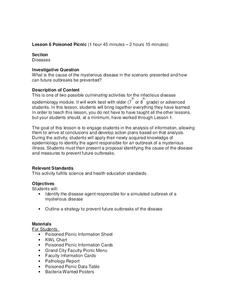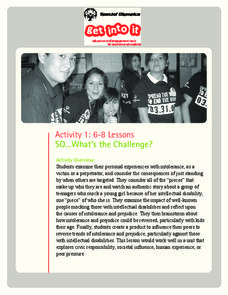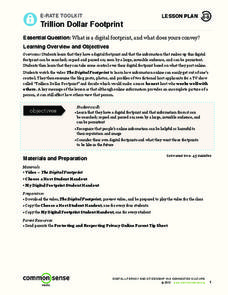PBS
Ebola Outbreak
As of April, 2016, more than 28,000 suspected cases of Ebola were recorded in Western Africa with over 11,000 human deaths. Classes discuss the Ebola virus outbreak in 2014 and then groups develop an action plan based on research,...
Centers for Disease Control and Prevention
Poisoned Picnic
A group of teachers attended a picnic; ten became sick and another four died. Young scholars must solve the mystery of what happened. They research the river, waste water treatment plant, each food that was served, and environmental...
Centers for Disease Control and Prevention
Teach Mrs. Jones' Class about Microbes
During a biology lesson, scholars research microbes, design a lesson plan using an outline, and present the lesson to the class.
Earth Day Network
Staying Green While Being Clean
Clean up the environment with a lesson that focuses on replacing hazardous cleaning supplies with green, environmentally-friendly products. Using a dirty patch of surface as a control area, kids clean other parts of various surfaces...
Stanford University
A Healthy You
Go beyond counting calories with a healthy eating unit that focuses on reading nutritional labels, making healthy choices, and incorporating fitness into daily life. After four lessons about the different ways kids can improve their...
Nemours KidsHealth
Stress: Grades 9-12
Everyone feels stress from time to time, but how can you move past it? A seven-page packet of activities guides high schoolers through the process of recognizing and managing their stress. The resource includes discussion topics, a quick...
Curated OER
Teen Driving: Skills, Responsibilities and Reactions
As an introduction to the skills required for and responsibilities of driving, pre-teens and teens engage in a series of activities, chart their response times, and analyze how variables effect these reaction times. Class groups use the...
King Country
Lesson 7: Relationships - Day 5: Acquaintances & Strangers
What is the difference between a friend and an acquaintance? What about an acquaintance and a stranger? As part of a unit on Family Life and Sexual Health (FLASH), class members role play appropriate responses to situations involving...
Special Olympics
SO…What’s the Challenge?
Whose responsibility is it to protect equal rights? Class members engage in a series of activities that create awareness of the prejudice and intolerance persons with disabilities face. They then create a message addressed to their...
King Country
Lesson 2: Private & Public
What is the difference between a private and a public place? The focus in this second lesson on family life and sexual health is building an understanding of the difference between the concepts of private and public and the behaviors...
King Country
Lesson 1: Introductory Class
This first lesson in a unit on Family Life and Sexual Health (FLASH) has class members establishing the rules of behavior that will create a safe environment for the discussion of these sensitive topics.
New South Wales of Education and Communities
Recognising Unsafe Situations
As part of a unit on personal safety, class members are asked to assess the level of risk in a series of 20 situations and then share their ratings, and the reasons for these ratings, with others. The goal here is for young people to...
Common Sense Media
Private Today, Public Tomorrow
What responsibility do we have to protect the privacy and safety of others when posting information about them online? This is an essential lesson for every learner today experiencing their social and professional worlds in an online...
Common Sense Media
Cyberbullying: Crossing the Line
Teach pupils to identify different forms of cyberbullying, including harassment, deception, “flaming,” and threats to safety, as well as how to handle a situation in which cyberbullying might be involved.
Common Sense Media
Trillion Dollar Footprint
Learners explore their digital footprints, and discover how information they put online can easily be searched, copied, forwarded, and seen by a large audience.
Curated OER
The Anxiety Workbook For Teens
Teens often face a great deal of worry in their lives, and can be at a loss with how to anticipate and handle their emotions. This workbook is an exceptional resource for both educators and students alike as a way of supporting teens in...
Common Sense Media
Which Me Should I Be?
Impress upon learners the importance of considering how we identify ourselves online, and how this relates to overall considerations of safety and digital wellness.
Self-esteem fund
Self‑Esteem Activity Guide (For Youth Leaders of Young Girls)
Did you know that over 70 percent of girls avoid certain activities because they feel bad about their looks? This fantastic resource includes 18 tried and true activities designed to help girls establish positive self-esteem.
Office of Disease Prevention and Health Promotion
Eat Healthy • Be Active Community Workshops
Recipe makeovers, healthy alternatives, quick tips for a nutritious lifestyle...this 187-page document has it all! Don't miss a thorough packet of workshop activities and handouts designed to support your teaching of the MyPlate...
Family & Children's Service
Children in Change
While children may not have the opportunity to directly affect the changes happening in their family life, help them develop necessary coping skills for expressing their emotions and dealing with those changes.
Davis School District
Cooking Lab Make Up Form
Did one of your young cooks miss a lab? No worries. Here's a worksheet that offers those who missed the lab a change to make up the work and provide instructors with documentation.
CCEA
Home Economics: Teen Building
Learners explore the emotional and nutritional needs of teenagers in a six-lesson unit, which covers such topics as food sources, cooking skills, emotional well-being, and the positive effect of food and family occasions.
HealthTeacher
Get More Sleep
Help learners identify habits that interfere with sleep and to understand the importance of adequate rest and its impact on not only physical health, but also emotional wellbeing.
National Education Association
Rx for Understanding: Preventing Prescription Drug Abuse
Did you know more than 2,000 teens begin abusing prescription drugs each day? Ensure your learners are educated about the crucial health issue of prescription drug abuse with this unit.

























